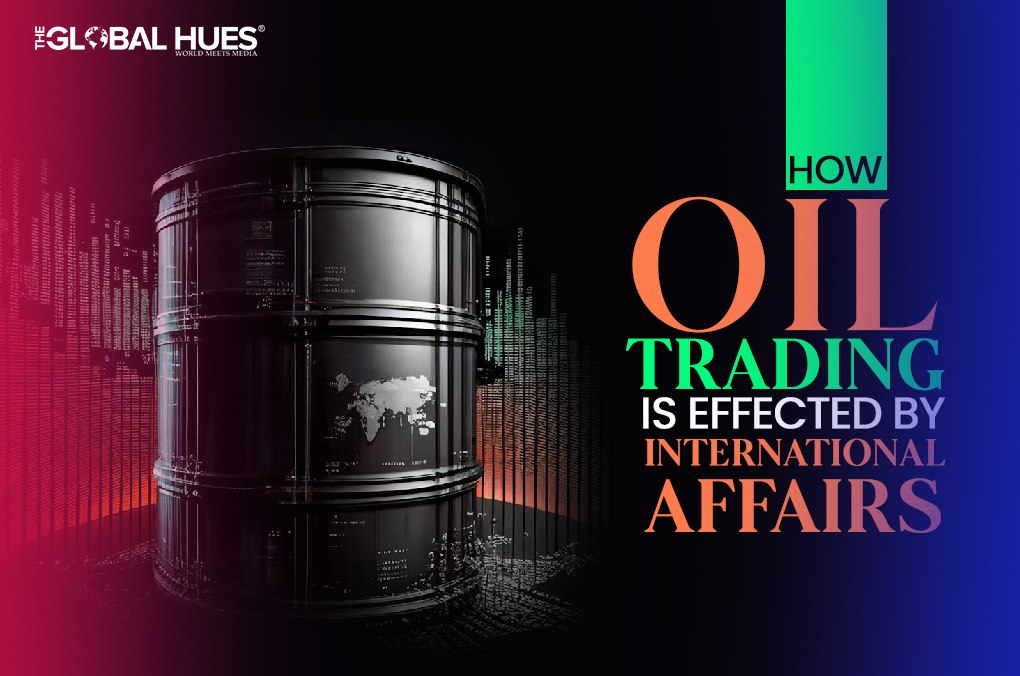Crude oil, often referred to as “black gold” is at the intersection of geopolitics and the global economy and is one of the most critical drivers in international relations. Consequently, oil trading dynamics are instrumental in determining the direction of trends in the market while at the same time shaping diplomatic maneuvers and geopolitical chess boards. This paper provides an in-depth analysis of the interaction between oil trading and international relations, covering historical experiences, modern examples, and potential future implications.
Historical Context: Shaping Market Dynamics
Historical experience shows many cases when geopolitical events have violated the market balance and affected the price dynamics. The 1973 oil crisis that followed an Arab embargo to the West in response to its political support of Israel demonstrated how fragile the oil-dependent economy could be. Violent conflicts, like the Iran-Iraq war or the Libyan civil war, have proven the geopolitical risks of oil production. These examples are just a reminder of how intricate the connection between global politics and crude oil investing can be, even in relatively stable periods.

Current Trends: Geopolitical Hotspots and Market Volatility
Indeed, as the world becomes more interconnected, the ripple effects of geopolitical tensions continue to disperse across crude oil investing. For instance, the fierce conflict in Ukraine threatens to interrupt the Russian oil supplies to Europe.
No wonder that in these conditions, market participants are very concerned that the Russian Federation may disrupt the supply of oil to Europe – and this unsustainable situation adds up to increased market nervousness. Moreover, the geopolitical flammable areas, including Iran and Saudi Arabia’s confrontation on the Middle East’s playing ground, may flare up as large regional conflicts.
Economic Impact: Balancing Supply and Demand
Apart from considerations of a geopolitical nature, oil trading is also a major factor in the economic politics of most countries. This commodity is the most traded in the world and drives economic processes and development. However, soaring and risky oil prices can negatively affect countries experiencing the situation as an oil producer and consumers.
In particular, oil-producing countries often include OPEC members who account for significant revenues from energy exports in the state budget. So, if prices fall, the state’s economy is destroyed. In contrast, oil-importing countries are experiencing inflationary pressures and economic decline due to rising fuel prices due to increasing costs.
Key Players: OPEC, Russia, and the United States
The international oil market has the largest players in the world including the Organization of the Oil and Exporting Countries, Russia, and the United States. The OPEC which includes the largest revenue countries is controlling the oil prices domestically through the quantity of oil in supply. Russia is one of the largest oil exporters and holds a greater percentage on the global market.
The United States has also become an important influencer of the international oil market due to the shale revolution that transformed the country into a self-sufficient energy country including an oil product.
Oil as a Leading Cause of War
The contentious relationship between oil trade and international politics indicates that oil typically sparks international warfare. Although “resource wars” have likely been exaggerated—as surely all major world wars have not been fought over oil—there is no question that it has terrible political consequences and often serves as a contributing or even a leading cause of warfare.
Indeed, over a quarter and a half of all interstate wars were closely tied to factors related to oil during the past few decades. In other words, oil may account for dynamism in global security more starkly than almost all other factors. These dynamics manifest in a multifaceted manner: ranging from resource-oriented wars to dependence on oil stimulating petro-aggression in aggressive leaders, from externalizing civil wars in nations that produce it to conflicts over influencing oil markets and access to oil transit.
In other words, oil’s role in global geopolitics is vast and variegated, making preexisting tensions worse and spawning new ones. Since the global energy spread evolves with new manufacturers and oil price stability, it becomes more and more critical.
Regardless of new world patterns, the relationship between oil commerce and international affairs plays a significant role in determining global stability. Consequently, understanding and managing oil-driven international conflicts remain vital in terms of international security.
Russia Ukraine war
In the aftermath of the Russia-Ukraine conflict hitting the world, crude oil investing has been hit. The investigation of the oil price trends has gone structural and thorough as it seeks to establish every aspect of oil price movement. Russia, as the second-largest oil producer, has always been focus on oil prices both in the industry and in the scientific discourses.
This project is utilized in the identification of the impact of the Russia-Ukraine war on crude oil investment and prices. The study will be analyzed utilizing an Error Correction Model framework. The model will analyze the occurances that caused the variations from June 24, 2021, up to October 27, 2022. The event window analysis for the event that resulted in the crude oil prices fluctuations is choosen the occurance after the invasion. That is, 24th February 2022 to 27th October, 2022. On the other hand, the expected window which is taken as the during event, and meanwhile, before 24th February 2022 is considered, from 24th June, 2021 to 23rd February 2022.
The aim of this model is to help investors and policymakers and other stakeholders to gain all the dynamics surrounding crude oil investing which is largely affected by geopolitical events. The goal intended to be achieved from the study is to get a good understanding of the urge to which the crude oil prices fluctuate due to the occurrence of similar geopolitical events.
Impact of Deteriorating U.S.-Saudi Relations on Oil Production Dynamics
Recent events involving the U.S.-Saudi relationship and corresponding changes in oil production dynamics reveal how foreign policies and oil transactions go hand in hand. The weakening of Washington positions throughout the Saudi Arabia region has an immediate effect on the global oil market. While the U.S. is currently able to produce essential volumes of oil, at this very moment, the country is still buying 6 million barrels a day, reflecting America’s sufficient reliance on other countries.
The U.S.-Saudi relationship increasingly proved that outwardly peaceful agreements are not as clear in practice. As relations continue to escalate, the Kingdom may extend limits to stimulate prices, which will have a large impact on global oil availability. This will illustrate how the oil trading process combines diplomatic and market issues. Hence, the United States, as an influential buyer, will have to decide on the harsh reality of this environment.
Iran’s Role in Middle East Conflict
The Middle East conflict which Iran is involved is considered the largest threat to the global oil supply. This possibility is accompanied by serious consequences with targeted U.S. sanctions on the Iranian oil industry or even with the closing of the Strait of Hormuz due to Iran hostilities. The issue is that the Strait of Hormuz opens opportunities for the daily transit of 17 million barrels of crude oil, which is one-sixth of the whole world’s supply necessities.
In the case of this key source of transit being closed, the cost of crude will be increased by 20% during a month, showing the potential risk of the oil supply network to the geography risks of the Middle East. These facts show how fragile the global oil supply network is from the exposure to geopolitical events. This context means the probable case when events in one region may have a fatal impact on the whole oil market and critically damage the stability of the energy supplies.
Emerging Oil Markets: Implications for Global Geopolitics
The dynamics of crude oil investing are closely related to international affairs and, therefore, represent complex challenges and opportunities for policymakers. As many as sixteen new oil-exporting countries, largely from Africa, are likely to be established as the global oil industry transforms.
This type of transformation means that the geopolitical implications of international affairs in oil trading and in the reverse will also experience transformation. High prices in oil generally drive resource grabs and may lead to conflicts for oil-rich territories.
Similarly, areas of disputed sovereignty, including the East China Sea, South China Sea, and Caspian Sea, are particularly vulnerable to conflicts triggered by oil trading interests. The areas of concern are characterized by insufficient territorial boundaries and estimate predictions, thus increasing the risk of conflict through miscalculation and miscalculation. Therefore, the areas will be crucial to policymakers concerned with global security.
Also, policymakers will have to be vigilant in recognizing security risks from unexpected sources. The energy needs of their allies, as well as with their rival’s seemingly innocuous activities lead to aggressive opportunism that worsens the tensions in places with Stanley resources. Therefore, the understanding of the relationship between international affairs with crude oil investing aims to prevent the risks that come with conflicts.
As such, understanding the areas will help promote stability in energy markets. To avoid the risks mentioned above, policymakers must engage in systematic monitoring of the emerging direct security risks and anticipate geopolitical transformations – in a word, driven by oil dynamics. By prioritizing diplomacy and enforcement, policymakers can reduce the risks of oil-induced conflict and create opportunities for economic growth and progress.
In closing
To conclude, the complex connections between crude oil investing and international affairs exemplify how geopolitics, economics, and environmentalism intersect in the most challenging manner. Although the world is undoubtedly moving towards the end of the hydrocarbon era, oil will remain one of the key factors influencing all aspects of global politics and economics.




